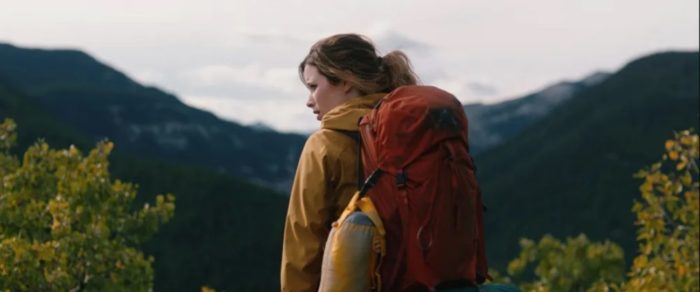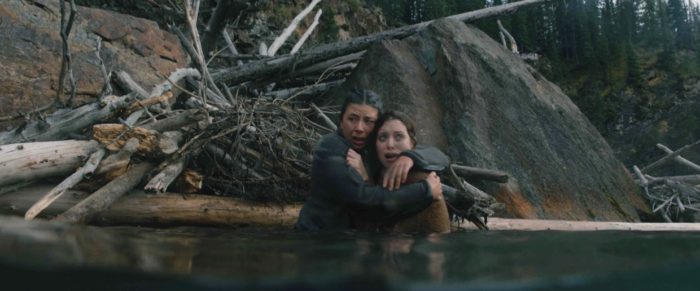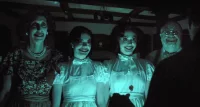When Fantasia announced a film by the name of Dark Nature, I quickly remembered the 2009 Troma film of the same name, a film that came recommended in a disorientingly similar way as Berkley Brady’s debut directorial feature. I remember being drawn to the title back in 2009 as if there were some bizarro displacement of normality that would transcend the brittle plastic of the Blu-ray disc and change everything we know about the natural world. Unfortunately, I took the title too literally, and the film ended up being more about the deviant behavior of a psychopath.
Brady’s film is more closely aligned with Dark Nature’s literal words, yet still not intrinsically the eco-horror concept I envision. Brady crafts an ideal location for a psychological horror sandbox, placing four women recovering from PTSD on a weekend hiking retreat with their psychologist as they try to work through their various traumas. Throughout their first day on the trail, they begin experiencing things they can’t explain, hearing sounds, and seeing things that recall the violent experiences that led them to become traumatized. Quickly, they become aware they’re being hunted as group members begin disappearing.

At the forefront of this story is Joy (The Purge series’ Hannah Emily Anderson). The victim of an intensely abusive relationship, Joy is closed off and defensive toward all her fellow group therapy partners, save for her best friend Carmen (The Expanse’s Madison Walsh). Whatever problems Carmen has gone through, she seems inordinately chipper and swears by Dr. Dunley’s (Orphan Black’s Kyra Harper) methods. It’s unclear whether she has undergone treatment or is only there for Joy’s support, but it’s easy to go with the flow this early on. The rest of the group doesn’t respond to Joy as charismatically as Carmen, Shaina (Roseanne Supernault) and Tara (Helen Belay) push back at her hostility as they travel through the Canadian Rockies together.
Brady has a good eye and utilizes some careful direction in those early scenes, fettering in clues and MacGuffins amid vast landscapes and drone shots. Carefully, the cinematography plays into the isolative concepts of the film, only to propose an apt paranoia when the women realize they aren’t alone. Her screenplay in those early scenes plays very well, too, especially the psychological aspects of the film’s early setup. Having witnessed the violence and terror of her last encounter with her ex-boyfriend Derek (Daniel Arnold), Joy looks agitated and almost agoraphobic about leaving her house when we first see her again. Anxiety appears as a response to retreating to an open place where she’ll likely not feel safe. As the group therapy utilizes sensory deprivation, the impact of a sound or sight from Joy’s past triggers her to believe Derek may have followed them here, stalking them in the woods.
Part The Descent and part Predator, Dark Nature’s tale of resilience to overcome the past and face your demons is a bit of a toss-up. I felt the movie thoughtfully constructed opportunities for creative scares using a monster that manipulates the past against you. Joy, suffering from flashbacks, makes for a superb target to gaslight a more terrifying reaction from as she drifts between reality and flashback instantaneously. But Berkley doesn’t take this route, or at least in nothing more than the most straightforward way possible, narratively speaking, opting for a more standardized woodland slasher vibe instead. This makes for a fascinatingly bland approach to the fine psychological setup achieved in the first act. That’s the hard part of Dark Nature. For as much of a trope as it’s become for women to doubt their sanity in psychological horror, the film never gets the audience to believe that Joy’s or anyone else’s sanity is ever in question.

I think it’s the atmosphere, and while some fantastic work is done in the sound design of Dark Nature, there are rarely any sequences of tension that follow. After the film’s terrific opening, nothing hits quite like that again until the end. And that isn’t for lack of trying on behalf of the film’s fantastic performers. I frankly grew to enjoy Madison Walsh in the supporting role and the chemistry she and Anderson have as besties shredding each other’s last nerve throughout the film, enjoying the drama of Carmen and Joy butting heads over the prison of anguish Joy has retreated into. Walsh’s tenderness through tough love is a large reason scenes toward the end of the film carry as much weight as they do. I have to assume that budgetary restrictions keep Dark Nature as a film of baseline adequacy. It’s watchable and delivers a couple of short-lived frights, but ultimately genre fans will guess the film’s final act and twist long before the credits roll.
There’s a lot of promise in the future of Brady as a director, and I will be looking forward to her segment in the upcoming Creepypasta: The Movie, but, as far as Dark Nature is concerned, it’s diversionary. A movie to put on to pass the time that only frustrates given its potential. Seeing this movie as part of Fantasia this week reminded me of another film I just reviewed, Blackwood. Both of these films strive to do very similar things through very different storylines, with similar results. We’ve seen versions of this concept before (see: The Ritual), and we’ll see it again because of how effective and cost-efficient it can be. I will say Dark Nature has the advantage over Blackwood here as the more engaging woodsy thriller, not feeling as bookended, though not without its moments of monotony.
Dark Nature played on July 18 as part of the Fantasia International Film Festival. The film is coming soon from Dread Central and Epic Pictures.



